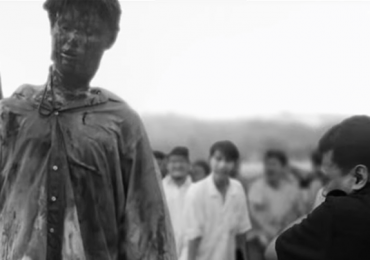Surrounded by a group of people cheering indifferently, various members of 10-strong group Rap Against Dictatorship take it in turns to lay down bars about corruption, greed, oppression and military rule in Thailand. The song “Prathet Ku Mee”, which means “Which Is My Country”, was only released in mid-October but has already amassed almost 22m views on Youtube, and around 810,000 “likes”.
But it isn’t only fans that have picked up on the hit.
Thai police were considering charging the rap group under the Computer Crime Act for “putting false information into cyberspace”, various local news outlets reported. Authorities came out on Tuesday to deny that claim.
Deputy police chief Srivara Ransibrahmanakul said no one had been called in for questioning and there was not enough evidence yet to charge the rappers. He added, though, that he would personally file a charge against the group for accusing him of trying to arrest them.
Police major general Surachate “Big Joke” Hakparn, deputy director of the police’s Technology Crime Suppression Division, appeared to agree.
“Phuyai (senior or powerful people) must accept [the] fact that it is not possible to prohibit or restrict personal opinions, especially among the youth. Adults should see them as views from another that they should listen to,” he said.
He added, “those who believe this kind of freedom of expression might hurt the country or people’s feelings should also understand that prosecution must be based on facts. The artists – and all sides – must be treated fairly so everything is resolved smoothly.”
Thailand’s Prime Minister Prayuth Chan-ocha also seemed to catch wind of the song. He refused to mention the song or group by name, but denounced the social media buzz it created. He said: “Use your own judgement. Is [life] really that bad? Is life really that hard? Is it that oppressive? Am I so dictatorial? If I were a dictator, I wouldn’t be here [to visit people]. I could just give orders somewhere else. Don’t let anyone distort the facts.”
The rap song was released on 14 October, on the 45th anniversary of the 1973 uprising against then-Prime Minister Thanom Kittikachorn, who was installed by a military coup. Seventy-seven people died in the violence that ushered in a parliamentary democracy. Three years later, students at Thammasat University were protesting against the return of one of Thailand’s ousted dictators, but this was perceived as an offence to the monarchy. Police and paramilitary forces besieged the university and the thousands of protesting students, leading to violent chaos that, according to some witnesses, saw more than 100 people killed, while others were raped or lynched.

“Prathet Ku Mee” makes reference to the event, featuring a dummy lynched to a tree in the background.
The song also references the ongoing court case against a Thai construction magnate who plans to build a road through a forest that hosts a number of threatened wildlife species. Premchai Karnasuta, the president of Italian-Thai Development that is undertaking the project, was arrested at a wildlife sanctuary, allegedly caught poaching a black Indochinese leopard. The case outraged Thai people, sparking demonstrations in Bangkok.
Rap Against Dictatorship disabled comments on the video in order to protect themselves, saying, “after consulting with a legal teal from the Thai Lawyers for Human Rights Centre, we have a concern about comments on the video,” the Bangkok Post reported.
The group added, “several comments might be considered to violate not only laws against petty offences, but also the Criminal Code. So the legal team suggested we turn off comments, otherwise, they might affect us in the future.”


